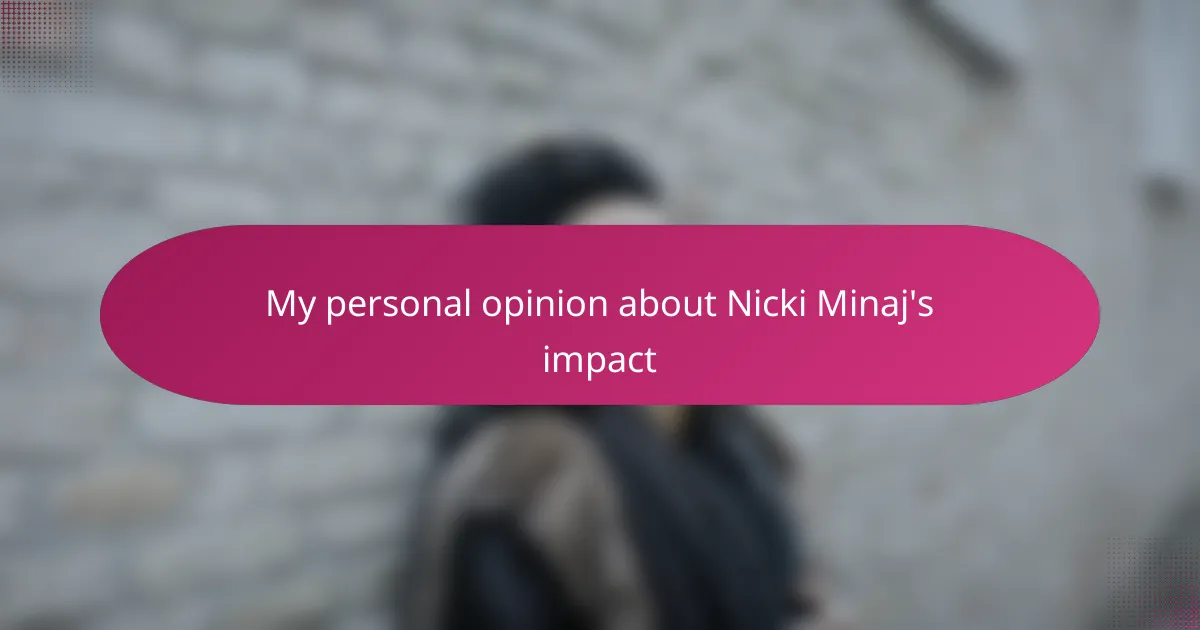Key takeaways
- Nicki Minaj has significantly influenced rap music, redefining the role and expectations for female artists in a male-dominated industry.
- Her unique blend of lyrical versatility and theatrical presentation has opened doors for a diverse range of female rappers, inspiring a movement of creative self-expression.
- Minaj’s cultural impact extends beyond music, making her a symbol of empowerment and bold individuality in the rap genre.
- Her legacy is marked by encouraging new generations to challenge norms and express themselves authentically, reshaping the landscape of rap music.
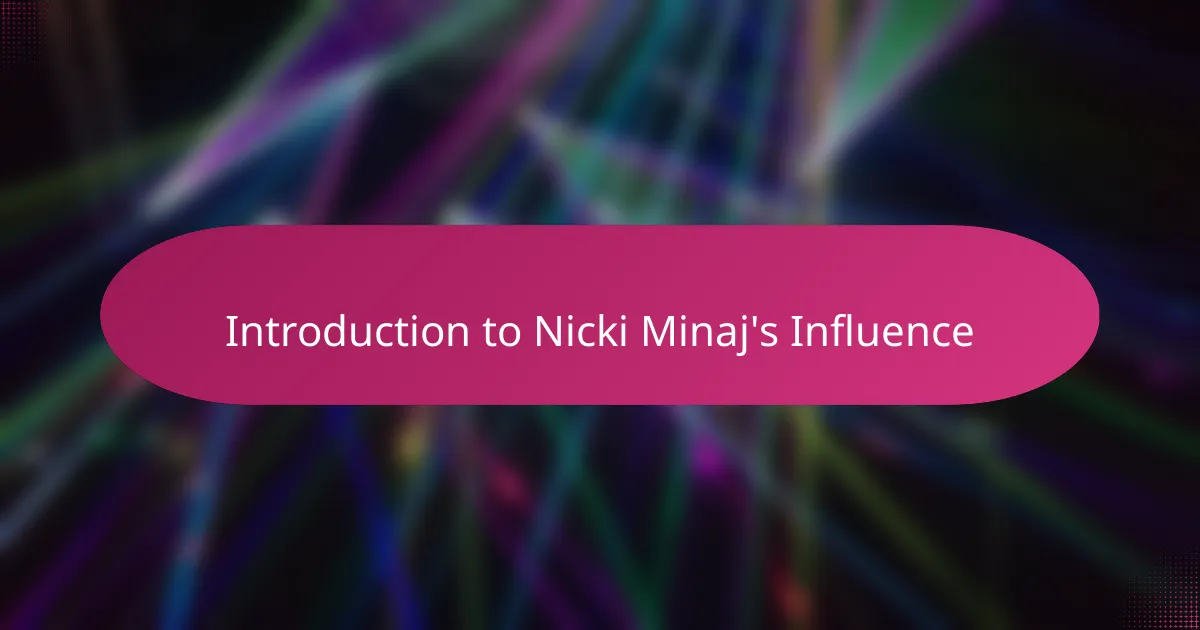
Introduction to Nicki Minaj’s Influence
Nicki Minaj’s influence in rap music is undeniable, shaping the genre in ways few artists have. I remember the first time I heard her bold, unapologetic style—it felt like a fresh wind in a landscape that needed her energy. Have you ever wondered how one artist’s confidence can shift an entire culture?
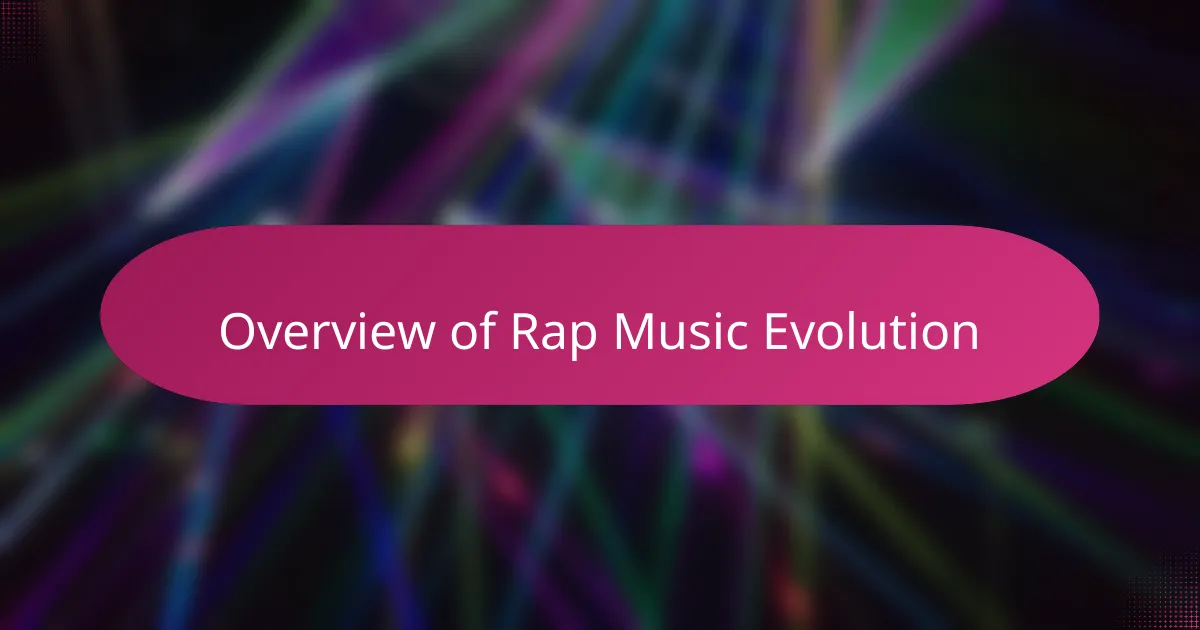
Overview of Rap Music Evolution
Rap music has come a long way since its origins in the 1970s, evolving from block parties in the Bronx to a global cultural force. I often think about how the raw, rhythmic storytelling of those early days laid the groundwork for today’s diverse sounds and styles. Isn’t it fascinating how something that started as a voice for marginalized communities became a worldwide phenomenon?
What strikes me most about rap’s evolution is its constant reinvention. From the lyric-heavy golden age to the trap beats dominating charts now, the genre has always reflected the times and the artists’ lived experiences. Have you noticed how each era brings its own energy, shaping what rap means for new generations?
For me, witnessing these shifts in rap music feels like watching a dynamic conversation unfold over decades. Artists build on what came before, challenging norms and expanding boundaries. It makes me wonder: how will today’s talents, like Nicki Minaj, influence the next chapter in rap’s ongoing story?
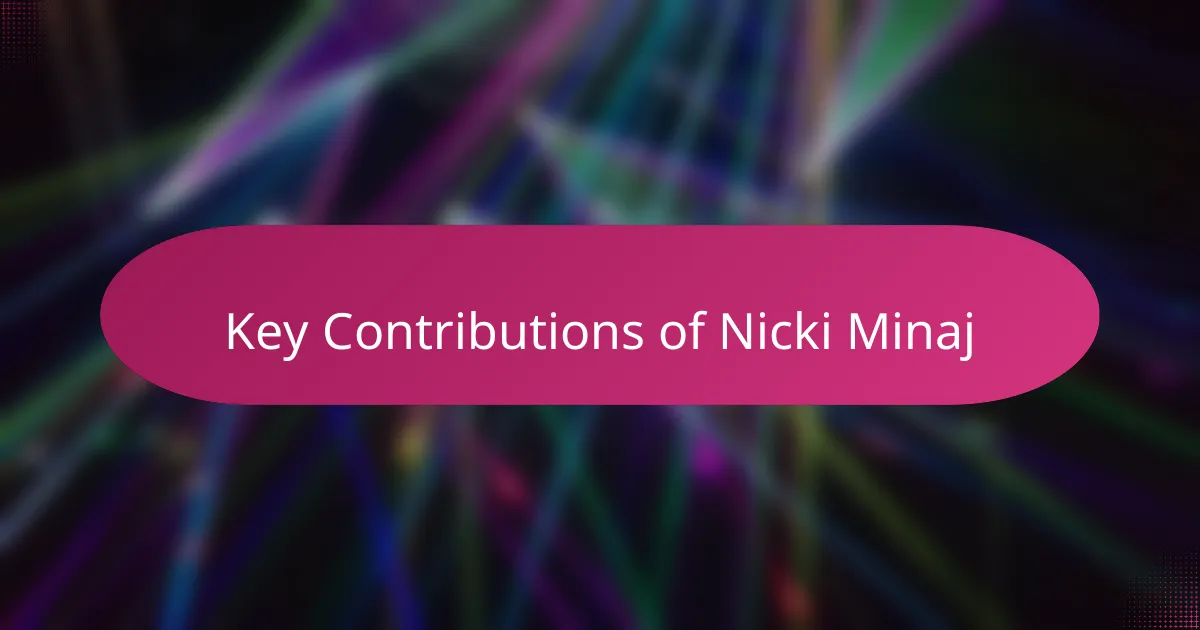
Key Contributions of Nicki Minaj
What really stands out to me about Nicki Minaj is how she redefined what female rappers could achieve in a male-dominated industry. I remember feeling inspired by her fearless lyricism and theatrical personas that brought a new level of artistry to rap. Have you ever seen an artist who not only commands attention with their flow but also turns their image into a powerful statement?
Nicki’s ability to blend sharp wit with catchy hooks changed the game for accessibility in rap. She made complex wordplay feel approachable and even fun, which is no small feat. From my experience listening to her tracks, it’s clear she opened doors for a new generation of women to express themselves boldly and creatively.
Another key contribution is how Nicki shattered stereotypes with her versatility—effortlessly shifting between aggressive battle raps and mainstream pop hits. That crossover appeal, in my opinion, helped rap gain wider acceptance without losing its edge. Doesn’t it make you wonder how different the landscape might be without her breaking those boundaries?
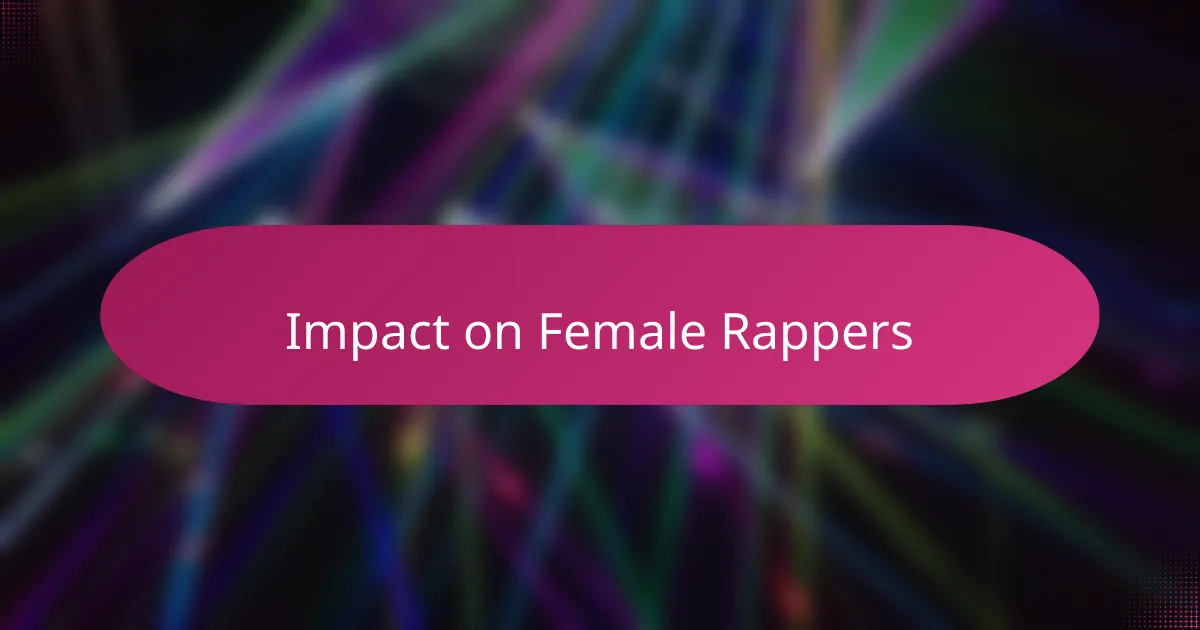
Impact on Female Rappers
Nicki Minaj’s impact on female rappers goes beyond just chart success—it’s about changing mindsets. I’ve seen countless new artists cite her as their reason for picking up the mic, inspired by how she unapologetically owns her space. Isn’t it powerful when one artist’s confidence sparks a whole movement of women refusing to be sidelined?
What I find fascinating is how Nicki normalized diversity in style and personality within female rap. From vibrant costumes to switching flows mid-track, she showed that women don’t have to fit a single mold to be taken seriously. Have you noticed how many female rappers today experiment with their image and sound, carrying forward that legacy of fearless individuality?
From my perspective, Nicki also helped raise the stakes for female rappers financially and culturally. She proved that women could headline massive tours and dominate social media, shifting the industry’s expectations. When I look at the female rap scene now, it’s clear she paved the way for women to be both commercially successful and creatively respected.
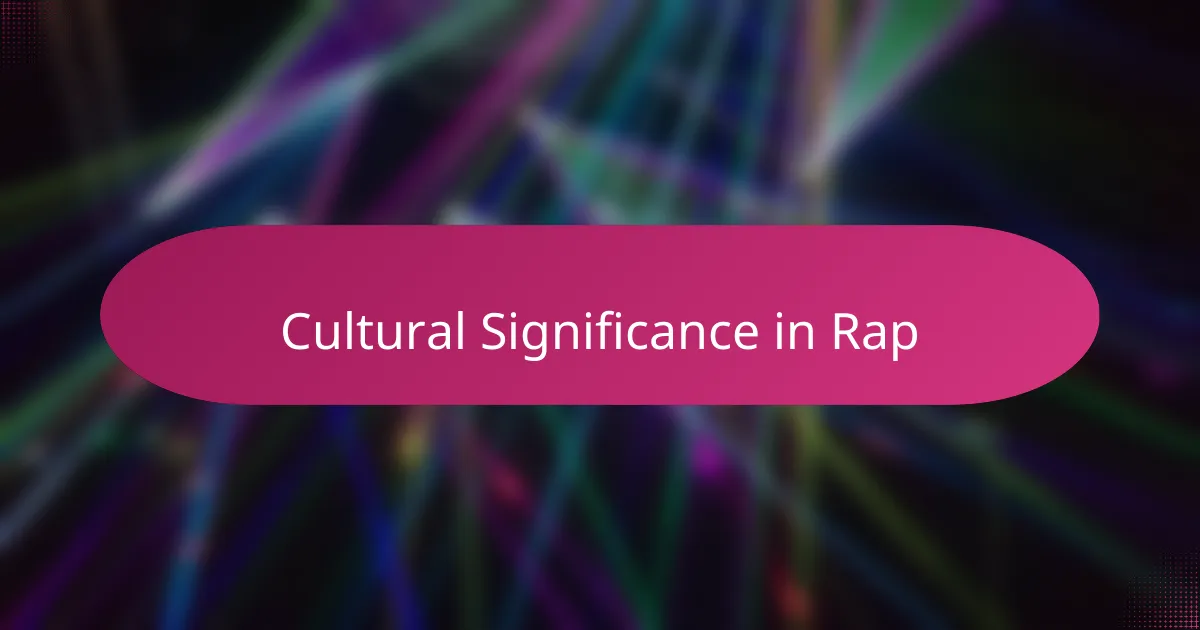
Cultural Significance in Rap
Nicki Minaj’s cultural significance in rap goes beyond music; she became a symbol of empowerment and bold self-expression. I remember how her fearless approach made me rethink what it meant to be a woman in rap, breaking barriers that once felt impenetrable. Hasn’t her presence made you consider how culture within the genre can shift simply through authentic confidence?
What amazes me is how Nicki infused rap culture with a vibrant mix of theatricality and authenticity. She didn’t just rap—she created characters and stories that resonated deeply with fans, turning cultural narratives into personal ones. Don’t you find it compelling when an artist’s identity shapes conversations about identity on a larger cultural scale?
From where I stand, Nicki’s impact also highlights rap’s evolution into a platform for diverse voices and styles. She’s proof that rap culture isn’t monolithic; it thrives on individuality and reinvention. Isn’t it inspiring to see how her influence pushes the boundaries of what rap culture can represent today?
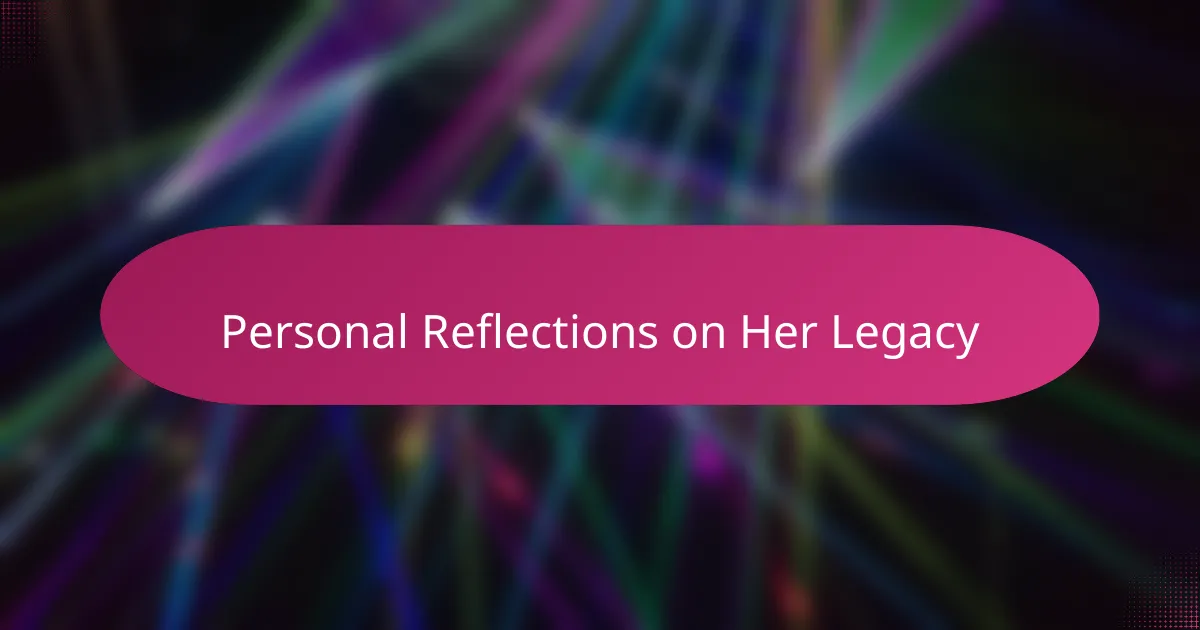
Personal Reflections on Her Legacy
Thinking back on Nicki Minaj’s legacy, what strikes me most is how she didn’t just influence rap—she transformed it into a space where bold individuality reigns. I recall feeling a genuine excitement whenever she dropped a verse, knowing she was rewriting the rules for women in a genre that often felt restrictive. Doesn’t it make you appreciate the courage it takes to be such a trailblazer?
Her legacy, to me, lives in the artists and fans who see her as more than a rapper—as a symbol of unapologetic self-expression and resilience. I’ve met young women who told me Nicki’s music gave them the confidence to find their own voice. Have you noticed how personal empowerment can ripple out from one artist and change countless lives?
At the same time, Nicki’s imprint on rap culture is layered; she balanced theatrical artistry with raw lyricism in a way that felt both groundbreaking and genuine. It makes me wonder how future generations will interpret her impact—will they see her as the fearless pioneer who expanded the genre’s possibilities or as the artist who simply dared to be herself against all odds?
